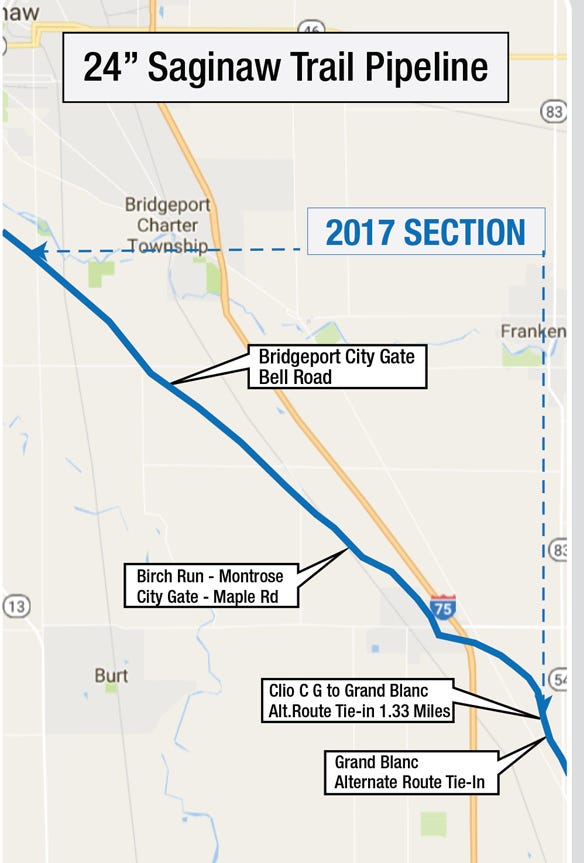
Consumers Energy is seeking to secure rights-of-way across all private property it needs to construct a natural gas pipeline from Flint to Saginaw.
The pipeline will upgrade to 24-inch-diameter pipe from 12- to 16-inch diameter. The project replaces portions of the existing Saginaw Trail Pipeline, originally built in 1942 on what was primarily agricultural land.
However, due to residential and commercial growth around Flint and Saginaw, 25.8 miles of the existing pipeline will be abandoned in place, and 41.9 miles of new pipeline will be installed around Flint and Saginaw, impacting 961 acres of agricultural land and involving 650 landowners in Saginaw, Genesee and Oakland counties. The Saginaw Trail Pipeline, if approved as proposed, will span 94 miles.
Consumers Energy has been communicating with landowners, local government and related organizations, and safety officials along the pipeline route through several channels, including letters, postcards and face-to-face meetings.
The company filed an application and testimony Sept. 2 with the Michigan Public Service Commission, seeking a Certificate of Public Convenience and Necessity to construct and operate the proposed Saginaw Trail Pipeline.
According to Alan Ackerman, managing partner of Michigan-based Ackerman Ackerman & Dynkowski, more than 3,000 notices were sent out to government entities, businesses, landowners and those within 500 feet of the proposed pipeline. Ackerman specializes in representing landowners in eminent domain issues and has been an adjunct professor teaching eminent domain law at the University of Detroit Law School since 1983. He now serves as an adjunct professor at Michigan State University College of Law.
“This pipeline is most likely going through, as I don’t see anyone getting in their way on this,” he says. “Someone would have to prove that there is not a public need for it, but I don’t believe they would be very successful. The Attorney General’s Office can object, but I believe that is unlikely.”
An environmental assessment for the proposed pipeline concluded that construction would have no significant adverse impact on the environment.
5-year project
Consumer Energy plans to begin construction of the Saginaw Trail Pipeline this summer if the proposal is approved and finished in five years.
According to Consumer Energy, the current natural gas landscape favors growth in its demand. The company believes increasing the diameter of the pipeline to 24 inches is in the best interest of customers, because the current transmission system is approaching its pressure and capacity limits under design peak day conditions. The pipeline is also reaching the end of its operational life.
Debra Dodd, Consumers Energy senior public information director, says the project is necessary to enhance reliability and safety for the company’s natural gas customers.
Michigan contractors for goods and services are being used whenever possible for the $636 million project. According to statement from Consumers Energy about agricultural land, open-trench construction will be used where possible and permitted. Boring of the new pipeline will be done under most roadways and where required for environmental reasons. In agricultural and farm fields, the pipeline will be buried at a depth of 4 feet.
Crop damage relief
Consumers Energy will pay 250% of crop damage (to cover four years) to affected landowners.
All farm tiles will be relocated on affected properties. Consumers Energy will repair tiles should damage occur.
Within Consumers Energy’s application it says, “In active croplands, pastures and hayfields, topsoil will be stripped to a typical depth of 12 inches over the entire construction right-of-way. Topsoil will be segregated from the subsoil excavated from the trench to ensure preservation of topsoil. Following pipeline installation, the subsoil will be returned to the ditch, and the topsoil then replaced in the area from where it was stripped to facilitate vegetation growth and crop production.”
Farm disruption, the company says, will be limited to the growing season during the year of construction. Farmland along the project route is expected to return to agricultural use after completion of construction. Agreements will be made with individual property owners of agricultural land to provide compensation for crop damages or losses.
Construction of the pipeline will typically require a 120-foot-wide construction corridor or construction right-of-way, according to the application.
Ackerman says there may be some long-term effects on soils. “It’s possible that many of these landowners don’t understand the extent of the notification they got. No one really wants to be bothered, and it’s not always a question of money. Farmers who are to be impacted should watch this project closely so they are not taken advantage of,” he advises. “Landowners will be compensated on a per foot basis for damage, but each case is individualized.”
Woodland impact
The assessment corridor crosses about 688 acres of woodland. Construction will require the removal of trees to prepare the construction workspace, which is limited to 75 feet.
Trees cleared within the temporary workspace areas will be allowed to regenerate following construction. However, Consumers Energy is required to maintain its pipeline easement to allow visual inspection of its pipeline and to facilitate pipeline repairs, if required. The new pipeline easement will permanently impact about 23.6 acres of woodland.
$134 million project
The project will cost about $134 million and will be completed in time for the winter heating season.
Construction will begin at a Consumers Energy valve site in Saginaw County south of Evon Road and continue south to a natural gas city gate facility near Vienna Road in Genesee County.

GO WIDE: The pipeline will upgrade to 24-inch-diameter pipe from 12- to 16-inch diameter.

About 20 miles of pipeline will be replaced, as well as the rebuilding of three existing city gate facilities. City gates reduce the pressure of natural gas flow necessary to transport it through the pipeline system, so it can be safely delivered via smaller distribution lines to farms, homes and businesses.
A field office for this project is located in Thetford Township at the northwest corner of North Genesee and East Dodge roads on land owned by Consumers Energy. This will allow construction crews to easily make their way north or south to perform work on the pipeline.
A copy of Consumers Energy’s application may be reviewed on the commission’s website or at the office of Consumers Energy Company. For more information on how to participate in a case, contact the commission at 517-284-8090. Additional questions about the project can be directed to Consumers Energy at 844-502-9014.
About the Author(s)
You May Also Like






